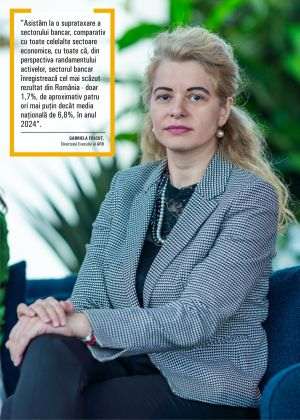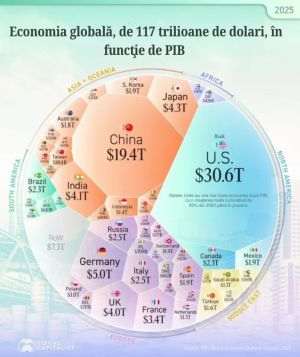• Interview with Mr. Daniel Dăianu, first vice-president of the ASF, former minister of finance and member of the European Parliament
• The public-private partnership, a solution for the rescue of the Central Counterparty
Reporter: How do you see the Romanian financial markets?
Daniel Dăianu: First of all, we need to consider the international context, the situation of deep financial crisis, which affects the functioning of the markets. Banks and insurance companies need to have a more solid base of owners' equity, to become more robust, and more resilient to shocks. These requirements complicate the relationship with the real economy as the cash-flow of companies is deteriorated as is the people's purchasing power; it is also at odds with the premises of restarting the economic engines. The macro context is and will continue to be very complicated, with returns on investments which can go from very low yields (due to the printing of money by the major central banks) to high levels, when the liquidity in the markets will tighten up. The demographics of Europe are also causing a major stress for insurers, and the crisis of the social security systems.
It is no big secret that the financial markets in Romania are underdeveloped. Simplicity can be an advantage under the current circumstances, when considering the problems caused by the numerous very risky, highly toxic derivatives. On the other hand, a frail capital market, such as ours, doesn't help the alternative financing of companies when banks have very low lending appetite, when they are deleveraging. But something else needs to be said as well: there are many domestic companies that don't like transparency, which don't want a listing. Is the number of low companies listed on the BSE the exclusive result of the public policies? Let's not imagine that the stock exchange will see a decisive reinvigoration through IPOs of public companies alone. Some companies even prefer to get delisted, to avoid being pressured by the minority shareholders, or by the dropping prices of their shares.
Daniel Dăianu: We have very "thin" capital markets, that discourage the entry of foreign investors (those that want easy entries and exits); on the other hand, large entries of portfolio investors can be a "blessing in disguise", such as the excessive strengthening of the leu. Your newspaper constantly comments on the traits of the domestic financial markets. It remains to be seen how the insurance companies will deal with complying with the Solvency II requirements, and the amortization of the shocks induced by the macroeconomic conditions; some of them need to be more careful to the unconvincing manner that they practice re-insurance in. The private pension funds need to be ready to communicate to the public what mark to market of their investments means. There are many other aspects worth discussing.
Reporter: What is the role of the ASF (Financial Supervision Authority) under the circumstances?
Daniel Dăianu: In the EU, there is a trend towards institutional integration, which seeks a better oversight of the micro and macroprudential risks, of the ties between the two types of risks; the integration of the markets forces integrated supervision. In fact, we have proposed to the Council to have an integrated supervision department. And research, which needs to include macroprudential aspects, also needs to develop within the ASF and there will be a specially devised department for that purpose. The authority needs to do what every financial markets regulatory and supervision authority in Europe is trying to do. To apply new regulations which heed the lessons of the crisis, which reflect a changing legislation, a reform in the EU. There is an intense activity at the level of the three European Authorities, (EBA/ The banking Authority; EIOPA/ European Insurance and Occupational Pensions; ESMA/ European Securities and Markets Authority, at the level of the European Council for Systemic Risks (ESRB), which supervises directly what the national authorities are doing, hence, the ones in Romania as well. In Romania, the ESRB has a corresponding entity in the National Committee for Financial Stability, which brings together the NBR and the ASF. The financial markets need to serve the economy better, the consumers of financial services. The authorities of R&S are called to ensure the best protection of the customers. For that purpose, the financial products need to be "friendly" to consumers/investors, frauds need to be punished, systemic risks need to be mitigated, the companies' behavior should not be separated from the professional ethics and good practices (I am also referring here to unfair competition, which is also visible on the Romanian markets). The risks taken on need to be well known/understood by investors, those that provide financial services should honor their professional and fiduciary obligations. The financial industry is still in crisis; it is still undercapitalized and it has a faith deficit. The R&S reformation hasn't ended yet. My opinion is that the financial industry in the industrialized world is oversized, it needs to change its nature, to become simpler and to once again focus its attention on the traditional functions of financing and insuring the economic activities; it needs to cut its trading operations, which exacerbate volatility and destabilize markets, to promote transparency.
Reporter: What can the ASF do to help the stock market?
Daniel Dăianu: The stock market needs to be developed, due to several reasons. One, which applies to all of Europe (compared to the US), is that companies depend exclusively on bank loans. And since the banks are in a process of readjusting their portfolios, of "deleveraging", financing must seek alternative sources, which basically means the stock market. Except for the situation when companies rely on self-financing, or have extraordinary competitive opportunities (but how many companies do?), which provide them with lots of liquidity, without obstacles. Unfortunately, it is very difficult to stimulate anything in cases of acute crisis. In Romania, the stock market is far underdeveloped in Romania, compared to other European countries. It is a legitimate question and one which it seems many market players are asking, concerning the optimal number of stock exchange operators, given the conditions induced by the crisis, the consolidation and the fierce competition in Europe, especially in our region. We see how Warsaw is beginning to shape up as a pole, almost in tandem with Vienna. What can we do for the Romanian stock market activity to endure under these circumstances? All the stakeholders need to join forces to prevent the Romanian stock market from having to be euthanized. A new CEO of the BSE should not be awaited like a Messiah. I am actually surprised at the statements lacking sobriety that some people are making, by analogy with the world of football. Also, we need to create the institution of the central counterparty, like the EU is asking and as is reasonable. Colleagues of mine have mentioned the intention of the ASF to reach a clarification of the status of the Rasdaq, and a regulation of the forex market. And it is worth examining the fees charged for trades, so we can support the domestic stock market. We also need to strengthen the oversight, so that companies need to comply with the rules of behavior on the market, to respect their customers. Supervision needs to be more vigilant in order to prevent frauds, scams, abuse of dominant position, collusion to corner the market. The dialog with the market players needs to be better. But the development of the market first depends on the players themselves. The state can't work wonders, it can't be a deus ex machina.
Reporter: CNVM and the brokers have issued warnings concerning the risks of trading on the Forex market, but they haven't always reached the intended audience. What measures do you think the ASF should take for that segment? Are you considering regulating the Forex segment?
Daniel Dăianu: I've mentioned earlier that the forex market is being watched by the ASF and that concrete measures will soon happen. Just like in other European countries, the forex market can be considered a market for trading derivatives. Meaning that only authorized companies would be legally allowed to provide these services and the trades would be subject to rules of transparency and mandatory information of the clients regarding the assumed risks, etc. Unfortunately, the internet is a vehicle that makes it very hard for regulators to do their job. For instance, you can see forex ads pop up during an online athletic event, inviting you to trade. The virtual space is not easy to master... The appearance of "dark pools", operated by major financial (banking) groups, doesn't help with market transparency either, meaning it goes against the steps to reform the financial intermediation system. The irony is that these "dark pools" are also created for getting away from unfavorable quotes induced by algorithmic trading, by "predatory" entities.
The regulation and the supervision of the forex market, domestically and abroad, even if it were to make great progress, can not spirit away a far more complicated problem, which concerns the overall financial system. I am referring here to interconnectivity given the terms of the sale/buying operations, which can exacerbate volatility, destabilizing moves - this also includes "high frequency trading" which is facilitated by special programs. Out of control technology can play tricks not only to individual investors, but to the overall system as well. Let's remember, for instance, the "Flash crash" of May 6th, 2010 on the New York Stock Exchange, when Dow Jones Industrial Average fell almost 9% and how fast it happened. We are thus seeing an additional reason for capping leverage for financial entities, hence on the shadow banking sector as well. A problem is that unfortunately, the authorities often can't obtain the data concerning the leverage of many high risk funds. I've been party to such a confession from an official of the Bank of England in a recent debate. We are seeing an evolution of the complexity of the financial systems that does not help their balance, and the prevention of serious crises. There are two opposite facets of complexity: one which facilitates balancing; the other which balances systems. The huge challenge is how to make Janus' good face prevail. Can the evolution of complexity be pushed in the right direction? We thus return to the flaws of the efficient markets hypothesis. What can regulators and overseers do in that regard is a crucial question. And I once again reiterate the idea that we need to return to reason, to a simpler financial system, more focused on the needs of the real economy. When Paul Volcker said that the only major financial innovation of the last few decades was the ATM, he may have exaggerated a little, but he did hit the nail on the head.
The ESMA keeps warning the users concerning complex, risky derivative products. The problem is that this range of products is increasingly greater and unlike smoking, where the risks are par excellence individual, derivatives, to say nothing more about synthetic products, contribute to the exacerbation of systemic risks. In my opinion, it is not enough for investors to be warned, like smokers, along the lines of "trading is dangerous for your wealth", as a paraphrase of "smoking is dangerous for your health".
Reporter: What do you think will be the consequences of the inability of our exchanges to set up a local Central Counterparty?
Daniel Dăianu: Life is also made up of such failures, of private market players; this is a case of market failure. But thinking that nothing can be done is wrong. I think that there is a need for the intervention of the public authorities to deal with the situation of the central counterparty. A public private partnership in that regard would be a solution under the current circumstances. Perhaps the NBR will get involved, one way or another. Public intervention would have a role of coordination and of overcoming the short-sightedness of some of the market players.























































